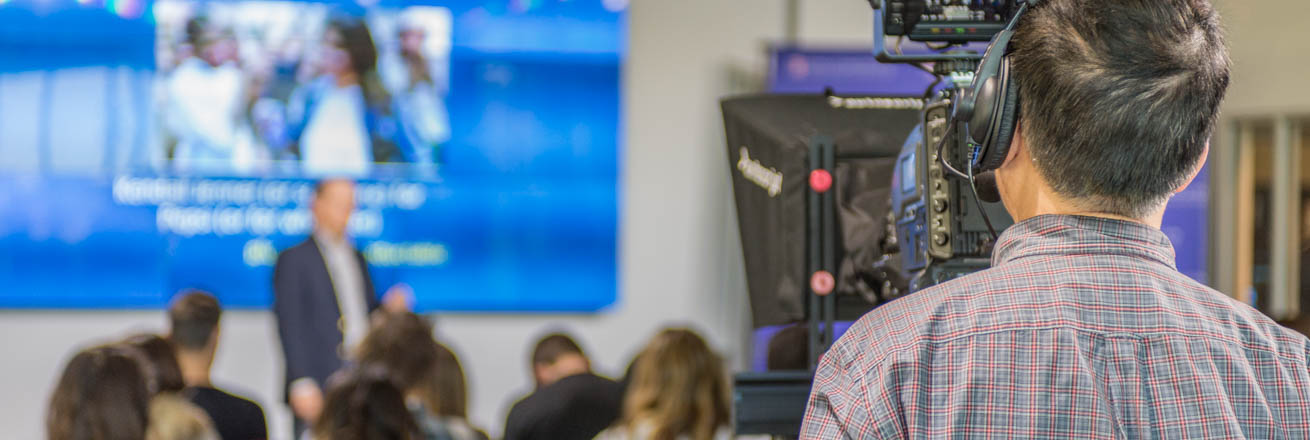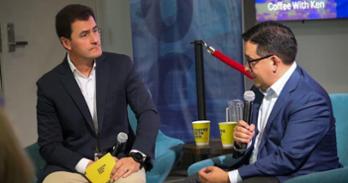Contact Us
McKinley Building, Room 111 on a map
Office of Graduate Academic Services 4400 Massachusetts Avenue NW Washington, DC 20016 United StatesInvestigate. Innovate. Inform.
The AU School of Communication MA in Journalism and Public Affairs prepares you for a career as a news and information professional. You can focus your studies in investigative, broadcast and international journalism where your topics range from data journalism and politics to racial justice, immigration and policy. Up to five graduate students can be selected for a three-week, all-expenses paid trip to one of the top investigative journalism programs in Norway. You also can cover, in person, congressional hearings, the various agencies of the federal government, and oral arguments at the U.S. Supreme Court. We partner with top media outlets and changemaking nonprofit news organizations to offer prestigious fellowships. You also will write for thewash.org, the journalism division's news site. Finally, SOC is home to the Investigative Reporting Workshop (IRW), an independent, nonprofit newsroom; through an innovative training hospital model, IRW pairs graduate students with professional reporters and editors to produce stories on a range of issues, from health and science to policing.
Fieldwork Features
Explore The Wash—AU's dynamic platform where graduate journalism students publish compelling stories from across D.C., showcasing their fieldwork beyond the classroom. Now featuring select undergrad work, it's your window to real-world journalism produced by our students in the nation's capital.
Recent News
The latest on our students, alumni, professors and programs. Want more? See all SOC news.
Frequently Asked Questions
What is the Boot Camp for Journalists?
Boot Camp gives you the first picture of what journalists face every day. During this required, immersive program, you will learn the basics of researching and reporting under deadline conditions. The intense schedule focuses on information gathering, writing, and producing for a variety of media platforms, all against a backdrop of the constantly changing media industry. With classes running from 9 a.m. to 5 p.m. every day, Bootcamp helps you build strong fundamentals in critical thinking, news judgment, interviewing, ethics, and verification, as well as a basic skill set in digital audio and video editing.
What opportunities will the School of Communication give me to advance my career?
In Washington, DC—where local news is national, or even international—not only will you have opportunities to report on Capitol Hill, the DC government, federal agencies, and national and global policymakers, you can gain even more experience through internships and fellowships at major national and international news outlets including The Washington Post, Politico, NBC4, and National Public Radio. Our Investigative Reporting Workshop allows you to work with preeminent journalists on significant national and international investigative journalism projects about government and corporate accountability, ranging from the environment and health to national security and the economy, and to experiment with new models for creating and delivering investigative projects.
How can the School of Communication help me with mentoring and networking opportunities?
The School of Communication has a distinct advantage among comparable institutions for the many different experiential learning opportunities offered to students. Internships are a way of life here. Graduate students can receive course credit for one internship, but most students have two or three, thanks to faculty and alumni who share their professional contacts.
We also have an active and effective alumni mentoring program that will help you build your professional connections and networks. Through our Dean's Internships, we work with world-class partners to connect highly qualified students with meaningful, real-world assignments that create future pathways to jobs.
What does your accreditation mean?
Both our bachelor's and master's degrees are accredited by the Accrediting Council on Education in Journalism and Mass Communication (ACEJMC). We are the only ACEJMC accredited graduate journalism program in Washington, DC. Accreditation is an important mark of external validation. It means our programs have been vetted by industry influences, including scholars and professionals. Practitioners who hire our students know they have a firm grounding in the field.
How does the School of Communication help students meet industry leaders?
The School of Communication hosts a variety of panels, events, and presentations by local and international industry leaders each semester. While many are open to the public, some are exclusive to currently enrolled students.
What are the expected outcomes of this program?
- Define the key ethical and legal issues for journalists.
- Critique the evolving role of journalism in a democracy.
- Demonstrate diverse and inclusive values in journalism.
- Develop multiple digital skill sets applied across varied platforms.
- Produce professional-quality, accurate, verified work.
Still have questions? Send us an email: GradComm@american.edu




